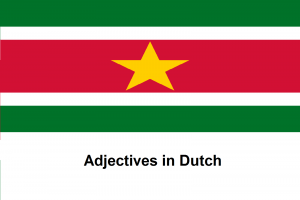Difference between revisions of "Language/Dutch/Grammar/Adjectives"
Tags: Mobile edit Mobile web edit |
(Adjectives in Dutch) |
||
| Line 1: | Line 1: | ||
[[File:Adjectives in Dutch .png|alt=Adjectives in Dutch|thumb|Adjectives in Dutch]] | |||
. | |||
. | |||
Hello everybody, | |||
In today's lesson you will learn '''"ADJECTIVES"''' in Dutch. | |||
Feel free to edit this page by adding new words and expressions ! | |||
Good learning! :) | |||
. | |||
'''Adjectives''' in Dutch (''Dutch:'' Bijvoeglijke naamwoorden/Adjectieven) can be placed before the noun or after the noun, just like in English. When the adjective is placed after the noun (mostly using a verb like ''zijn (to be)),'' or when the adjective relates to another adjective, it is called an '''adverb''' (''Dutch: Bijwoord)''. | '''Adjectives''' in Dutch (''Dutch:'' Bijvoeglijke naamwoorden/Adjectieven) can be placed before the noun or after the noun, just like in English. When the adjective is placed after the noun (mostly using a verb like ''zijn (to be)),'' or when the adjective relates to another adjective, it is called an '''adverb''' (''Dutch: Bijwoord)''. | ||
Revision as of 08:51, 30 June 2019
.
.
Hello everybody,
In today's lesson you will learn "ADJECTIVES" in Dutch.
Feel free to edit this page by adding new words and expressions !
Good learning! :)
.
Adjectives in Dutch (Dutch: Bijvoeglijke naamwoorden/Adjectieven) can be placed before the noun or after the noun, just like in English. When the adjective is placed after the noun (mostly using a verb like zijn (to be)), or when the adjective relates to another adjective, it is called an adverb (Dutch: Bijwoord).
The following examples are all adjectives and no adverbs!
Remark: When you're talking about superlatives, the following may occur: Jij bent de grootste jongen - You're the biggest boy (In the superlative, it's possible that the adjective has two consecutive vowels, which is not possible in the regular form) |
Past participle used as an adjective (Voltooid deelwoord gebruikt als een bijvoeglijk naamwoord/adjectief
It is possible to use a past participle as an adjective, just like in English. However, there are some rules you have to follow.
|
